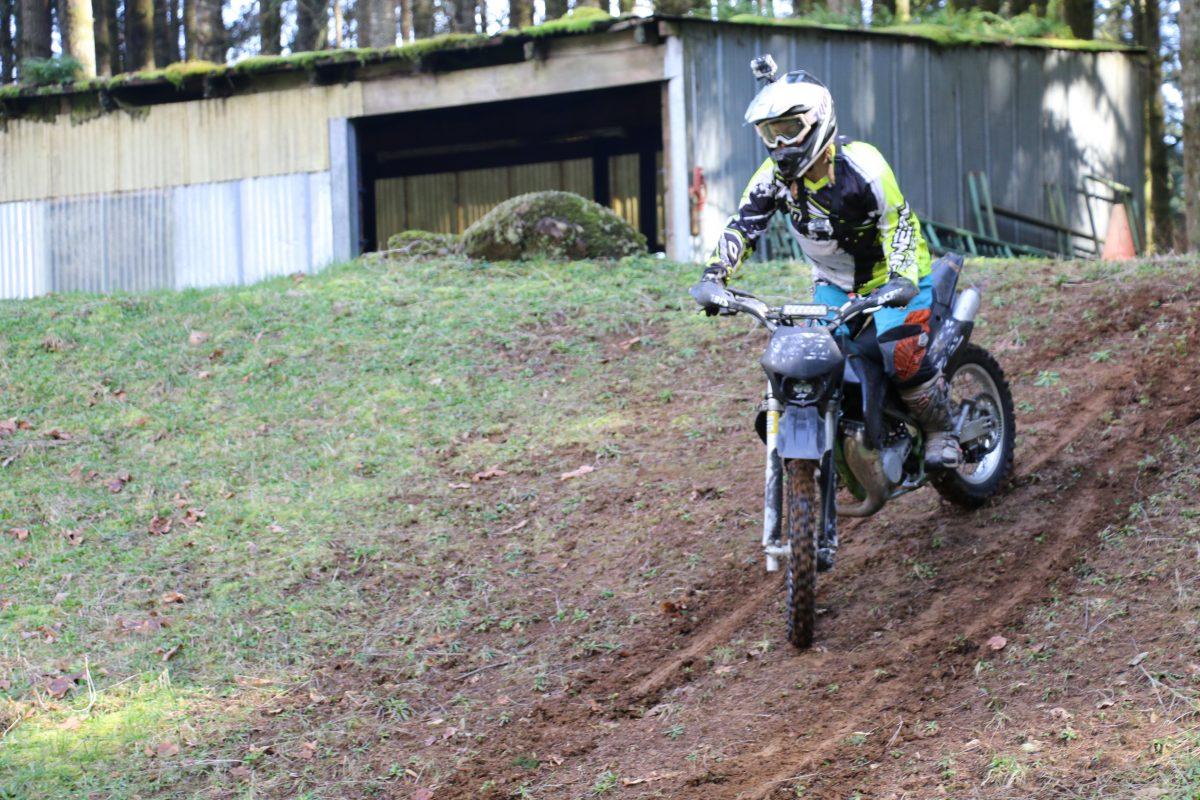
BY KRIS FANT
My relationship with Coach Stroud started with his question, “Are you okay with having your laundry hanging out for all to see? The good, the bad and the ugly?”
My response, “I’m a semi-professional laundry air-er, so I’m good with putting it all out there,” seemed to amuse him. Thus my journey into student-centered coaching began. The questions and information in this article can be used for your own self-knowledge, and this self reflection may prompt you to find your own ride coach!
Self Exploration
Before starting any type of training, Coach Stroud asks a series of questions. “Tell me what do you want? Is there a big trip on your calendar? What turns you on about motorcycles?What are your fears and your dreams. Tell me, how is it going? Really, how does it feel when you are on your bike? Do those feelings change under stress?”
Can you answer these questions? How honest are you? Why are you on this bike in this forest? Do you love the view? Is it the company? Perhaps you can’t get enough of the solitude. How do you feel when you roll on the throttle? What is your first thought when you see a rock garden? Do you live for hillclimbs?
Now ask yourself, what are you willing to do in order to perform well at this sport? Many classes offer immediate gratification. They spend a little time teaching theory, but much more time teaching specific skills you will need to ride off road. At the end, the students get to say “I hopped over a log!” These classes are great at teaching enough skills to get by. When you ride after this training, some of the time you may feel like you know exactly how to handle something. But then there’s the other times. Those moments when you think “How on earth did I just pull that off?” Or worse, the moments you didn’t pull it off and you need medical attention.
What do you want from off road riding, and what are you willing to do to get there?
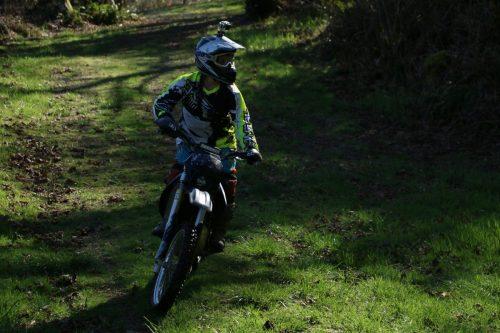
This is where student-centered coaching begins. If you start by answering the above questions for Coach, he gives you so much more than 100%. Early in our conversations, he wrote this “means I am serious about you. Meet me halfway or don’t waste my time.” Before starting this relationship, make a commitment to yourself that you will train daily, be open to feedback, and be honest with yourself and your coach.
My Goal
In November, I want to ride LA to Barstow to Vegas in the longest two day dual sport event in the world. It’s two hundred and fifty miles a day of sand, which has been my arch-nemesis. In general, I’d like to improve my skills in all aspects of riding so I can enjoy any terrain I happen upon and keep up in skill and speed with my husband and others.
The Setting
If you are lucky enough to train with Coach at the Cascade Endurance Center Training Complex, you have a lovely ride east of Salem, Oregon. You wind through a small town, and up a steep gravel road, where you find the warning sign “Beware of Dog” right before you are greeted by the most adorable little dog and sleek black cat-who-thinks-it’s-a-dog that you can imagine. Coach Stroud greets you with a twinkle in his eye and makes you feel right at home. No matter what you were feeling on your ride, being immersed into Northwest beauty and hospitality will prepare you to focus and learn.
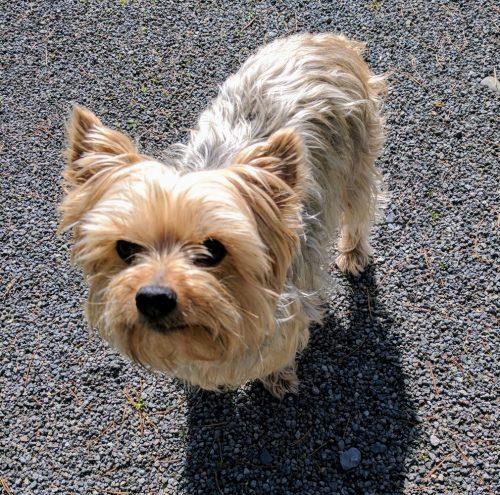
Assessment
Before starting training, Coach Stroud has a series of assessment exercises regarding physical fitness, balance, bike knowledge, anatomy knowledge, and a skills assessment. This is where student-centered coaching further parts ways from a traditional training class. In a traditional class, the curriculum and the exercises are adapted to the students in the class. In student-centered coaching, the student assessment generates the curriculum. Coach Stroud explained that before getting on the bike, we will verbally discuss the skill and often walk through it without the motorcycle. After all, how can he assess what you truly understand without developing a common vocabulary and discussing riding concepts?
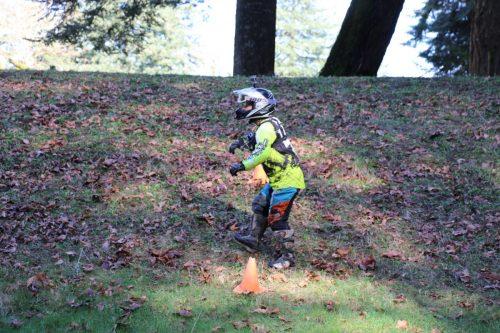
On leaving Coach Stroud’s training complex, I was given a simple instruction to increase my aerobic exercise to one hour, three times a week. Coach then sent me some reading material that reviewed our first lesson together.
I left in a reflective mood. What had just happened? In a completely safe and non-threatening environment, I’d stumbled over technical concepts, realized I hadn’t much of a clue about basic human anatomy, discovered that my understanding about how to manage a motorcycle had immense room for improvement, played on my bike, and found a mentor. Coach Stroud is patient and calm, but don’t let that fool you. His eyes are sharper than a hawk, and his knowledge is deeper than the ocean.
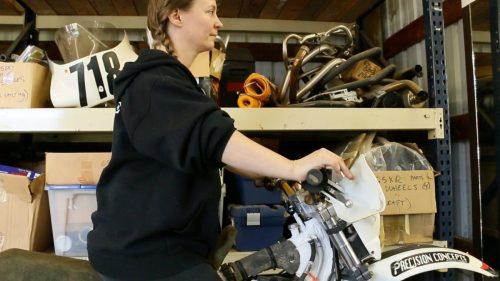
The Basics
Even though the first session was just assessment, I took away quite a bit of valuable information.
- Footpegs Up Assessment
- Feet: first base of support, balls on pegs
- Ankles: rolled slight toward the bike, providing a bit of grip
- Calves: tight against the bike
- Knees: gripping the tank.
- Knees in a turn: turn the outside toe in so the outside knee presses against the tank.
- Sit Bones: evenly distributed across the seat
- Back: flat, imagining someone is pulling you straight up by your hair
- Hips: folded gently forward
- Arms: soft arms and hands, relaxed shoulders
- Shoulder blades: pinched gently toward each other
- Eyes: up and moving
- Chin: pulled slightly back, as if you were trying to keep an apple, orange, or grapefruit from leaving the hollow of your neck.
- The language we use influences how we manage our motorcycle
- Grab a handful of throttle and other ways we attack obstacles: If we want maximum control, we don’t want to grab a handful of throttle or hit the hill. Tenderly and predictably dancing with our bike will give us confidence and conserve our energy so we can ride all day.
- The Stairway of Knowledge
- Unless you have never ridden before, it is likely there are some gaps in your knowledge base. Coach firmly believes in using an approach he calls KSA – Knowledge, Skills and Abilities to help riders develop a deep understanding of riding.
- Knowledge – Riders need to spend equal amounts of time in both understanding their body and the bike.
- Skills – This refers to applying the knowledge first in a safe and simulated way, either on a static trainer, a bike on its center stand, or having someone hold the bike for you. The second phase of skills practice is, using full gear, working on specific techniques and isolating variables.
- Abilities – In the abilities phase, you apply your skills in gradually more challenging real-world situations. By putting ourselves under gradual and controlled stress, we can learn to manage our fear responses and use our knowledge and skills to safely navigate challenging terrain.
- Unless you have never ridden before, it is likely there are some gaps in your knowledge base. Coach firmly believes in using an approach he calls KSA – Knowledge, Skills and Abilities to help riders develop a deep understanding of riding.
- Progressive Loading
- We can only learn one thing at a time.
- Start with Mind-Body connection.
- Then, Mind-Body-Bike
- Then the world!
- We can only learn one thing at a time.
- Being a lifelong learner
- Riders need to be students for life.
- Training is not just to get the license or to learn a few skills. On-going education results in comfortable control over the immense power of the motorcycle. Connection, confidence and freedom are the rewards for the time, effort and money spent on learning.
- Riders need to be students for life.
Stay tuned for tomorrow’s article, the assessment results!
If you’d like to know more about Coach Stroud, check out his website HERE, or download his first ebook HERE.

2 comments
Kris, the information you’ve provided is GOLD. Unfortunately, Coach has passed but, his message lives on through great articles like yours. I can’t seem to open the link to his ebook?
His passing leaves a hole, for sure. He was a truly amazing human and contributed so much to the motorcycle community. Thanks for the heads up about the link! I just fixed both links in this article.